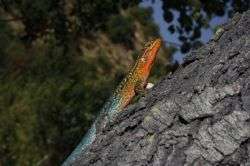Re-thinking 'adaptive radiation'—one of biology's most important concepts

A lizard lineage which has evolved over the last 19 million years has helped scientists to re-think one of the most important concepts of modern biology.
'Adaptive radiation' is recognised as a pillar of evolutionary science. It describes the development of new biodiversity, and is triggered when a species encounters a new environment with plenty of available resources – this is called 'ecological opportunity'. This single species then makes the most of these resources and multiplies rapidly into several new forms. When all these resources have been used up by new species, the process of biodiversity proliferation slows down dramatically.
'Early-bursts' of new species diversification have previously been seen as a central part of this process – scientists have for decades referred to this trend as a key component of adaptive radiation. However, new research published in the academic journal BMC Evolutionary Biology suggests that the term should not be defined by these early rapid surges.
The revelation comes from scientists at the University of Lincoln, UK, who have been investigating the evolution of the Liolaemus lizard – one of the most species-rich and ecologically diverse lineages of vertebrates.
Their study suggests that the gradual uplifts of the Andes mountain range in South America over millions of years led to the episodic emergence of ecological opportunity, which in turn caused several waves of diversification in this group of lizards. As a result, they found a number of peaks of originations diversification of new Liolaemus lizard species, rather than one 'early-burst'.
Dr Daniel Pincheira-Donoso, Senior Lecturer in the School of Life Sciences at the University of Lincoln, explained: "Our research shows that the diversification of the Liolaemus lizards has occurred in a number of episodes over an extended period of time. As the Andes uplifted, new ecological opportunity continued to emerge and new bursts of diversification took place – there was never an early explosion followed by a slow-down, but instead, constant pulses of new species evolution.
"We therefore suggest that the definition of the adaptive radiation theory does not need to include reference to an 'early-burst'. We instead propose that adaptive radiation should refer to lineages which, via natural selection, proliferate into multiple new species that differ in their ecological adaptations – regardless of whether this occurred early in the cycle or not".
The researchers chose to study the Liolaemus lizards because these reptiles have adapted to an exceptionally wide range of ecological and climatic conditions, including extreme deserts, cold climates, and high Andean elevations. There are currently more than 240 known Liolaemus lizard species, and this widespread lineage offers a unique model to investigate the causes and trajectories of adaptive radiations.
Part of the research project formed the basis of student Lilly Harvey's undergraduate dissertation at the University of Lincoln. Lilly, who is now studying a Masters in Research in Lincoln's School of Life Sciences, said: "As a young aspiring scientist it has been a fantastic opportunity to work on research of this magnitude".
The research also presents new findings about the locations of adaptive radiation. It was previously thought that situations leading to adaptive radiation occurred mostly on islands - where major climactic or geographic events are more likely to significantly change environments - however the Lincoln team conclude that ecological opportunity on mainland continents can still be a strong and crucial driver of adaptive radiation, even if it occurs less frequently.
More information: "What defines an adaptive radiation? Macroevolutionary diversification dynamics of an exceptionally species-rich continental lizard radiation." BMC Evolutionary Biology 2015, 15:153 DOI: 10.1186/s12862-015-0435-9
Journal information: BMC Evolutionary Biology
Provided by University of Lincoln





















